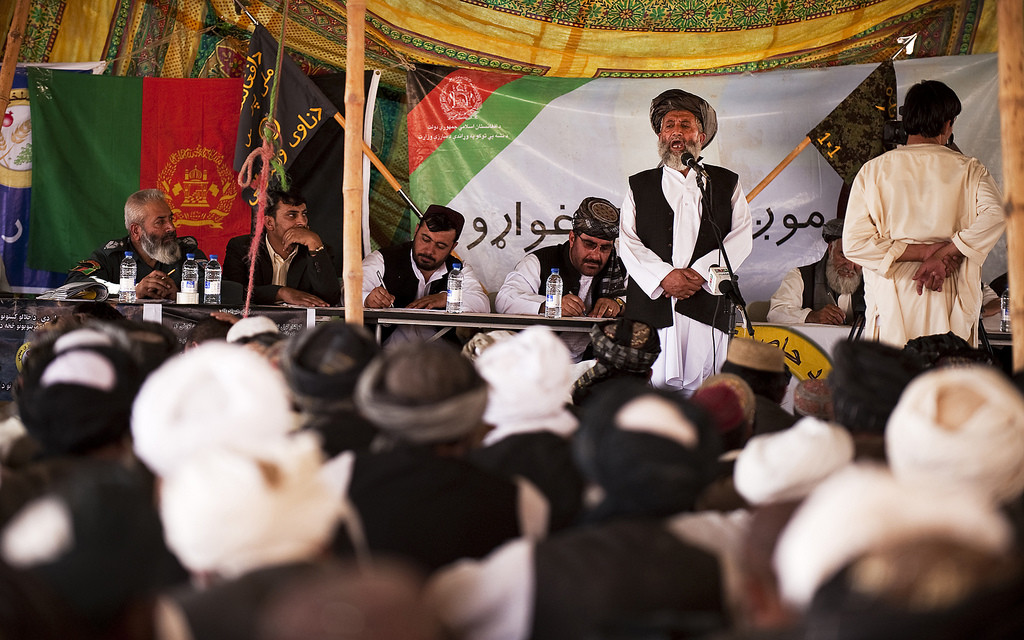An Afghan Death: Haji Abdul Manaf Was My Brother

Amid news of tragedies involving an Amtrak crash, another earthquake in Nepal, the seizure of Ramadi by ISIS fighters, Arab leaders meeting at Camp David, and countless odd bits of celebrity gossip, a murder in Afghanistan received little global attention. But this loss, and the leadership void it leaves in Helmand province’s Nawa district — one of the few indisputable success stories of the fourteen year war in Afghanistan — is a blow for progress and hope in the embattled country.
Haji Abdul Manaf, the district governor of Nawa, an area covering about 1,000 square miles and home to about 90,000 Afghans that borders the west side of the Helmand River, was gunned down on May 18 in an ambush while traveling to Kandahar from Nawa on official duties.
In the summer of 2009, Nawa was violent and lawless. Anyone living there who wasn’t Taliban and had the means to do so fled for safer places. The Taliban was well-entrenched, bullying the remaining locals out of their meager livelihoods, imposing threats and violence against any who questioned their legitimacy, and operating logistical supply lines of weapons, IEDs, and cultivated poppy for heroin production to other districts with near impunity. The 50 British and 30 Afghan Army soldiers manning a patrol base in the district center since mid-2008 could venture only a few hundred meters from its relative security without being engaged in a firefight with the insurgent gunmen who kept a constant watch on their movements.
The arrival in July 2009 of a reinforced infantry battalion of nearly 1,000 U.S. Marines quickly brought a much-needed peace to the district and with this greater security, the locals began to re-engage in commerce and travel about more freely. The Marines’ objective was to set the stage for the Afghan government to establish itself and begin leading the progress of the districts. The district governor played a critical role in what became the Nawa success story.
Haji Abdul Manaf came to Nawa in mid-July aboard a NATO helicopter that could only land under cover of darkness due to the constant threat of machine guns and rockets. He was not just arriving, but returning, having spent time in the district decades earlier, claiming to have fought the Russians among Nawa’s vast canals in the 1980s. His recent appointment as the district governor came with many risks, and little material reward. The “governor’s mansion” was nothing more than a crumbling cement goat barn with some hasty patches and strung lights powered by a generator, cracked and mismatched tables and chairs, and thin, dirty mattresses on the floor in the “bedroom suite.” He traveled constantly with the Marines, mostly on foot, but sometimes in their armored vehicles to attend meetings at the outer reaches of his district.
Gregarious and avuncular, he was a natural politician, enjoying the attention and well wishes of his constituents as he traversed through the district and enthralling the generals, congressional delegations, and reporters who flocked to Nawa to witness first-hand an Afghan success story. He would hold court over dinners of lamb over rice, eaten by hand while seated on the ground, always beaming and backslapping amid the raucous jokes and comments typical of men at arms serving in harm’s way. His English was limited, but one phrase he uttered frequently and with true sincerity always flattered the Marines around him — “You are like my brother.”
Even with his jocular demeanor, he understood the gravity and strategic significance of his role and his district, and worked tirelessly with the Marines and NATO civilian advisors, local tribal leaders, merchants, mullahs and citizens, hearing out their concerns and promising — perhaps sometimes overpromising — his best efforts to continue Nawa’s progress.
He particularly loved the Marines and was awestruck as he comprehended the fact that these young warriors had left their families to fight for people they had never met in a foreign land. So it was no surprise that when a young Marine was killed by an IED, Manaf asked to come to the field memorial service and say some words of thanks — translated by one of our interpreters — for the sacrifice made by this young man for the people of Afghanistan. He made his comments, then turned to the helmet, boots and bayoneted rifle signifying the presence of our fallen brother, straightened his back and made a crisp, solemn salute, having subtly asked for and been given a lesson in military saluting protocol by one of the battalion’s NCOs.
I saw that salute again a few months later. As my tour of duty came to an end and Nawa continued to thrive, the helicopter that would take me on the first leg of the long trip home landed in the middle of the afternoon in an open field outside our patrol base. Haji Abdul Manaf joined a group wishing me well, grasped my hand and held it as I lumbered with seven months of equipment and memories to the awaiting helicopter. Stopping far enough away that the noise of the helicopter’s rotors would not drown out our conversation, he turned to me, grasping my shoulders and said in his best broken English, “Jagran Gus, you are like my brother,” then stood erect and saluted with perfect precision.
For nearly six years, Manaf defied the odds and served tirelessly to bring about peace and normalcy in Nawa. His quarters improved somewhat during the time since we first met, but they never came close to luxury. Yet he carried on and endured. For that, Haji Abdul Manaf, my friend and brother, I salute you. Semper Fi.
Frank (“Gus”) Biggio served as an infantry Marine from 1993 to 1998. He returned to military service in the USMC Reserves with the 4th Civil Affairs Group between 2007 and 2010, deploying to Afghanistan in support of 1st Battalion 5th Marines in 2009. He is a lawyer and currently lives in Dubai.

